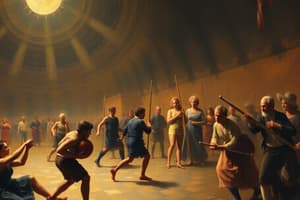Podcast
Questions and Answers
What is a common motivation for engaging in sports?
What is a common motivation for engaging in sports?
- Social media popularity
- Spiritual enlightenment (correct)
- Mental stimulation
- Financial gain
Which ancient civilization is credited with some of the earliest forms of organized sports competitions?
Which ancient civilization is credited with some of the earliest forms of organized sports competitions?
- Greek Civilization (correct)
- Egyptian Empire
- Chinese Dynasty
- Roman Empire
In medieval Europe, what martial arts were popular sports among knights?
In medieval Europe, what martial arts were popular sports among knights?
- Jousting and swordsmanship (correct)
- Taekwondo
- Sumo wrestling
- Judo
What fundamental aspect has made sports captivating to people throughout history?
What fundamental aspect has made sports captivating to people throughout history?
Which English public schools contributed to the development of sports like cricket and football?
Which English public schools contributed to the development of sports like cricket and football?
What American innovations significantly impacted the world of sports?
What American innovations significantly impacted the world of sports?
What is the primary distinction between individual and team sports?
What is the primary distinction between individual and team sports?
Which of the following is NOT an example of an individual sport mentioned in the text?
Which of the following is NOT an example of an individual sport mentioned in the text?
How did the development of sports change in the 19th century?
How did the development of sports change in the 19th century?
What was the impact of the 20th century on the development of sports?
What was the impact of the 20th century on the development of sports?
What role do sports play in human experience, according to the text?
What role do sports play in human experience, according to the text?
Flashcards are hidden until you start studying
Study Notes
Introduction
Sports, both professional and amateur, have been a fundamental aspect of human life for thousands of years. Whether it's an individual pursuit like running or swimming or a team endeavor like soccer or basketball, sports have captured the imagination and passion of people worldwide. This article explores the concept of sports, its history, and its impact on society today.
Definition and History of Sports
At its core, a sport is a recreational or competitive activity that requires physical skill. People have enjoyed sports for millennia, drawn to their inherent challenges and the opportunities they present for personal growth and achievement.
The origins of sports trace back to ancient civilizations where activities like footracing, wrestling, and hunting were pursued for entertainment and sometimes spiritual reasons. One of the earliest recorded instances of organized sports competition was the Olympic Games, which began in 776 BC in Greece. These games were initially centered around religious worship and celebrations honoring the gods, but they evolved over time to involve more diverse athletic disciplines.
As societies developed, so did the variety and complexity of sports. In medieval Europe, knights would engage in martial arts such as jousting and swordsmanship. English public schools fostered the development of sports like cricket and football, while American institutions contributed notably through innovations like basketball and baseball.
Types of Sports
Sports can broadly be categorized into two primary types based on participation dynamics: individual and team sports. Individual sports require each participant to compete independently, whereas team sports pit groups of athletes against one another. Some examples of individual sports include boxing, wrestling, fencing, golf, tennis, and swimming, while team sports range from soccer and basketball to sports like football (gridiron), cricket, and volleyball.
Modern Developments
Although sports have existed throughout history, it wasn't until the Industrial Revolution that they began to take on their current forms. In the 19th century, organizations started forming around specific sports, such as the Marylebone Cricket Club (founded 1787) for cricket and the Football Association (since 1863) for soccer. Similar developments occurred in the United States during this period, shaping the landscapes of both baseball and basketball.
In the 20th century, sports became even more widespread due to mass media exposure and increased international cooperation. Events like the Olympic Games expanded globally, introducing nations to new sports and fostering a sense of unity through shared athletic achievements.
Conclusion
From their humble beginnings as simple pastimes and rituals to their status as widespread cultural phenomena, sports have remained an integral part of human experience. They serve as platforms for self-expression, teamwork, and friendly competition, often transcending geographical boundaries and uniting people from different walks of life.
Studying That Suits You
Use AI to generate personalized quizzes and flashcards to suit your learning preferences.




